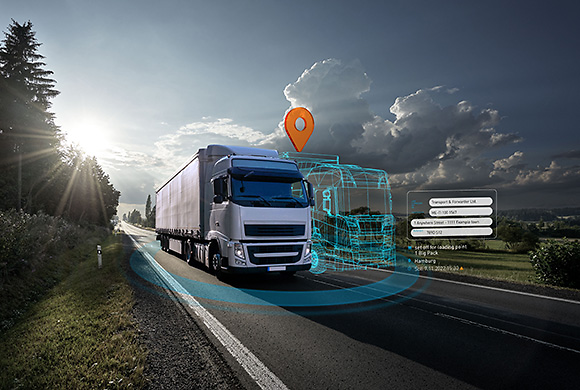What is integrated logistics?

Integrated logistics and our increasingly digital future
We live in a digital era. Constant technological development has revolutionised not only our daily, but also working life. The transport and distribution industry has also radically changed due to the artificial intelligence innovations. It is no coincidence that we hear about the integrated logistics now more than ever. But what is it?
What does integrated logistics mean?
Integrated logistics is versatile, forms an integral part of the supply chain management and stands for the use of new technologies within the supply chain. Everything is interconnected, transparent and resource-efficient. That way, weak points and disruptive factors in the process and supply chain can be fast discovered and eliminated. What does it mean for logistics?
Logistics stands not only for transport of goods, but also completion of versatile tasks such as procurement of products and commodities, storage of goods and their packaging. The transport of goods via the distribution network is the most important issue. The objective of the integrated logistics is to improve the coordination, networking and clear overview of all above-mentioned operations and also of the players in the whole supply chain, that is, manufacturers, suppliers and freight forwarders. To make it possible, a very good cooperation and communication between all players involved must be in place and this is more important than any technology.
Only if this is ensured, the application of digital innovations can become an excellent tool for logistics processes optimisation: less resources are used, which is beneficial for both companies and consumers. The companies reduce the costs while the consumers have their goods delivered in a very short time. The Timocom marketplace provides an opportunity to show everything in one system and also to incorporate already existing systems, so that duplications are avoided and no information gets lost in the disarray of print-outs and screens.
How does integrated logistics work?
It all starts with a receipt of a customer order which is managed by technological systems and employees in CRM (Customer Relationship Management). The use of ERP systems (Enterprise Resource Planning) is one of the most important technological aspects of the integrated logistics. But what is it? It is actually a software for the management of all operating activities from production to distribution. All departments are networked together. An ERP system offers a clear and transparent view of all operating processes and simplifies the recognition of possible shortcomings throughout the entire supply chain. After receipt of the customer order, the CRM verifies via ERP system whether the requirements to start production are met. If the requirements are not met, the CRM can forward the purchase enquiry via the ERP system to the procurement (purchasing) department which sends the necessary documents to the suppliers. The ERP system works as a digital hub which brings all players in the supply chain together and simply facilitates their communication.
After the request for deliveries, the next step is storage. As soon as the packages arrive in a warehouse, they are scanned and the data is forwarded to the operation centre in real time. The ERP system updates the event log and inventory. Then, the integrated logistics process ends with the storage in a warehouse and shipment to the customer, the operations which are properly recorded in the system. The stock is always up to date.
This means that the integrated logistics is essentially data acquisition and analysis. Monitoring them allows to take effective action on different levels of the supply chain. The use of modern technologies, such as artificial intelligence and machine learning also facilitates the creation of forecasting models which optimise the supply chain and can predict and immediately report the failures and disruptions throughout the supply chain.
Supply chain management: the future of logistics
Integrated logistics and supply chain management are closely interwoven. Professor Mentzen of the University of Maryland defined them as "a systematic coordination of traditional business functions and tactics within each company and throughout the supply chain which aims at improving the long-term performance of different players in the supply chain".
Companies do not operate on the market as "freelancers" any more, but coordinate with other players in the supply chain, first of all with suppliers. Therefore, the trend supported by the supply chain management starts a positive cycle which brings advantages to all players in the industry, and first of all puts the consumer's needs in focus.
The advantages that the supply chain management and integrated logistics bring, not only meet the needs of companies and consumers, but in a sense, also those of the environment. Supply chain optimisation also means reduction of energy consumption and efficient use of the truck transport which is responsible for a major part of the CO2 emissions as well as avoidance of empty runs. Both print-outs and postal services are used less frequently. Delivery notes, order forms and inventories are available in a digital form. It is no coincidence that the new technologies are also considered the best allies for energy saving on the way to a sustainable logistics.
Just like in the integrated logistics, one of the core values of TIMOCOM is the cooperation, a quality which also forms basis for Timocom Marketplace. Every day across Europe thousands of companies find offers of freight and cargo space here , which help them plan safe and efficient transport and thus obtain additional cargo and reduce costs. Storage spaces are also offered and rented.
Technology is another important aspect for TIMOCOM. The Marketplace provides you with a range of important digital services which can help you simplify handling many tasks, e.g., tracking cargoes via the Live Shipment Tracking application.
Become a part of the TIMOCOM world and discover all possibilities of our Marketplace. Logistics has never been so simple before!
